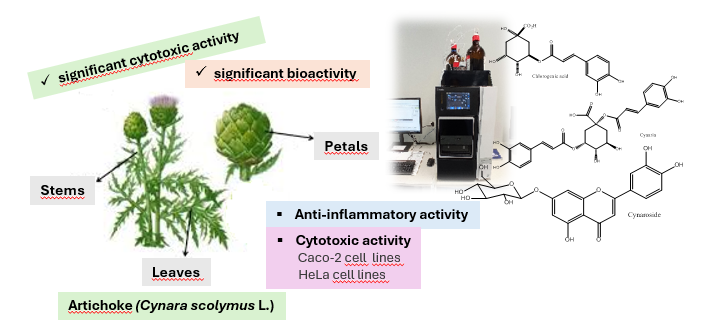JOURNAL 3094
Records of Agricultural and Food Chemistry
Year: 2024 Issue: 3 Special Issue: Abstracts 3rd. TCS, International Food Chemistry Congress February 29-March 03,2024 Antalya Türkiye
p.33 - 33
Viewed 1366 times.
GRAPHICAL ABSTRACT

ABSTRACT
Cynara scolymus L. (artichoke) is a member of the Asteraceae family and is widely cultivated in Mediterranean countries. In Türkiye, the average annual production is around 40.000 tons in the Aegean, Marmara, and Mediterranean regions. Since it has been used for therapeutic aspects alongside its usage in the Mediterranean diet, it is recorded in various pharmacopeia and monographs [1]. Some of the biological properties reported for artichokes are anticarcinogenic [2], antigenotoxic, hypocholesterolemic [3], antidiabetic [4], hypoglycemic, and hepatoprotective [5]. In addition, it is known to have significant medicinal properties such as antifungal, anti-HIV virus, and antibacterial properties [6]. Except for the edible part, C. scolymus L. generates much agricultural waste. Meanwhile, the packaging of harvested artichoke produces over 60% of waste. Cancer is considered one of the most fatal diseases all around the world. It is known that extracts obtained from the edible part of artichoke positively affect cancer cell lines. Therefore, to use the waste part of the artichoke, we aimed to study the antioxidant, anti-inflammatory, and cytotoxic activity of cooked and uncooked extracts together with their phenolic ingredients. The artichoke was collected from Dalaman-Muğla. The heat-treated and untreated portions of the artichoke's stem, petals, and leaves were dried in the shade. Different pH differentiation extractions were applied to cooked and raw parts of C. scolymus. The obtained extracts containing various amounts of phenolic compounds were studied for their antioxidant, anti-inflammatory, and cytotoxic properties. Cytotoxic activity was performed against human cervical and colon carcinoma cell lines. According to the results, the cooked artichoke extracts, containing a higher amount of cynarin, cynaroside, chlorogenic acid, 1,3-, and 1,4-di-caffeic acid quinic acids, possessed better results on human cervical cancer cell (HeLa) and colon carcinoma cancer (Caco-2) cells than the extracts obtained from uncooked parts.
KEYWORDS- Artichoke (Cynara scolymus L.)
- anti-inflammatory activity
- cytotoxic activity